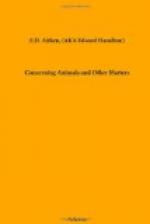It was January 13 of a good many years ago, in those happy days that have “gone glimmering through the dream of things that were.” The sun had scarcely risen, and I was sitting in the cosy cabin of my yacht enjoying my “chota hazree,” which, being interpreted, means “lesser presence,” and in Anglo-Indian speech signifies an “eye-opener” of tea and toast—the greater presence appears some hours later and we call it breakfast. I will not say that the view from my cabin windows was enchanting. The placid waters of the broad creek would have been pleasant to look upon if the level rays of the sun in his strength had not skimmed them with such a blinding glare, but the low, flat-topped hills that bounded them were forbidding.
The people said truly that God had made this a country of stones, but they forgot that He had clothed the stones with trees of evergreen foliage and a dense undergrowth of shrubs and grass, to protect and hold together the thick bed of loam which the fallen leaves enriched from year to year. It was the axes of their fathers that felled the trees, to sell for fuel, and the billhooks of their mothers that hacked away the bushes and grubbed up their very roots to burn on the household cooking hole. Then the torrential rains of the south-west monsoon came down on the naked, defenceless, parched and cracked soil and swept it in muddy cascades down to the sea, leaving flats of bare rock, strewn thick with round stones, sore to the best-shod foot of man and cruel to the hoofs of a horse. About and among the huts of the unswept and malodorous hamlet just above the shore there were fine trees, mango, tamarind, babool and bor, showing what might have been elsewhere.
On the rounded top of the highest hill frowned in black ruin an old Mahratta fort, covered on the top and sides and choked within by that dense mass of struggling vegetation which always takes possession of old forts in India. The weather-worn stones and crumbling mortar seem to feed the trees to gluttony. First some bird-drops the seeds of the banian fig into crevices of the ramparts, and its insidious roots push their way and grow and grow into great tortuous snakes, embracing the massive blocks of basalt, heaving them up and holding them up, so that they cannot fall. Then prickly shrubs and thorny trees follow, fighting for every inch of ground, but quite unable to eject the gently persistent custard-apple, descended doubtless from seeds which the garrison dropped as they ate the luscious fruit, on account of which the Portuguese introduced the tree from South America. I had penetrated into that fort and had seen something of the snakes and birds of night, but not the ghosts and demons which I was assured made it their habitation by day.




